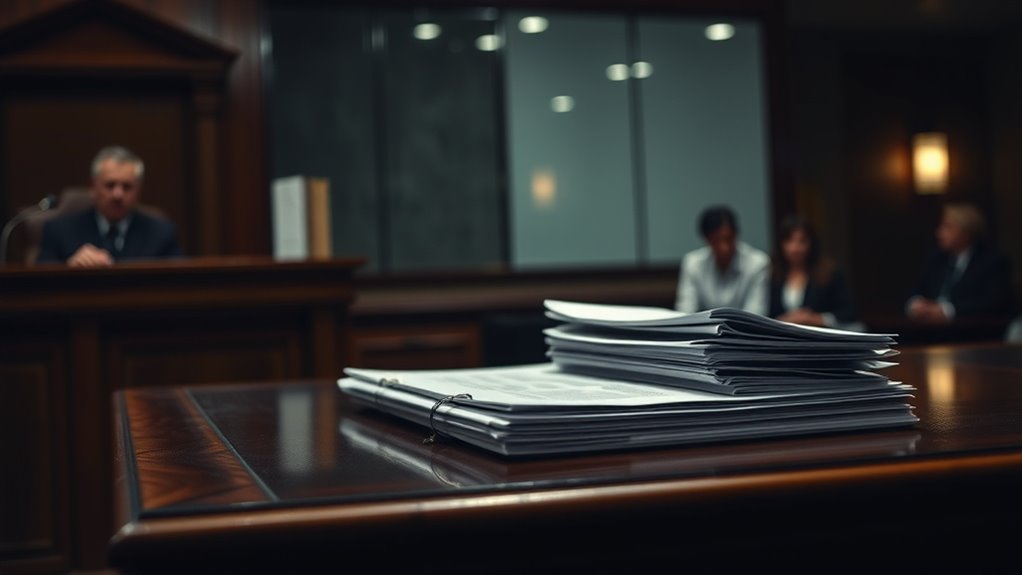In family court, many records and details are kept confidential to protect everyone’s privacy, especially children. You can usually access public court filings, but most sensitive information, like personal details and custody arrangements, are sealed or restricted. Accessing certain records often requires legal steps, and some case decisions are kept private to prevent exposing private matters. To fully understand what’s accessible and what’s hidden, keep exploring these privacy rules.
Key Takeaways
- Most court records, especially custody details and personal information, are sealed or restricted from public access.
- Parties involved and their attorneys can access certain confidential case information through legal channels.
- Public filings are typically available at the court clerk’s office but often exclude sensitive or sealed documents.
- Challenging confidentiality restrictions requires legal steps and may involve court approval or special permissions.
- Court decision details and private communications are generally kept confidential to protect privacy and ensure fair proceedings.

Family court often operates behind closed doors, leaving many people unaware of the secrets that can influence the outcomes. When you’re steering the legal process for custody, it’s natural to wonder what information is accessible and what remains hidden. While some details are public, much of what happens inside the courtroom is protected under court confidentiality laws. This confidentiality aims to protect the privacy of everyone involved, especially children. However, this secrecy can also make it difficult for you to fully understand how decisions are made or to access certain records related to custody arrangements. Court confidentiality extends beyond the courtroom to protect personal information from public disclosure. Sensitive details—such as financial statements, health records, or private communications—are typically sealed or kept confidential to prevent unnecessary exposure. This confidentiality safeguards the privacy of all parties, especially children, but it can also limit your ability to gather evidence or challenge certain aspects of the case. If you’re trying to access records related to custody arrangements, you may find that many of these documents are sealed or restricted, requiring specific legal steps to view them. Despite these restrictions, some information is accessible to the parties involved or their attorneys. Public records related to court filings are usually available through the court clerk’s office, but the detailed reasoning behind custody decisions remains protected. If you want to challenge or understand a custody arrangement fully, you’ll need to steer the limits of court confidentiality carefully. Knowing what you can access and what’s off-limits helps you better prepare for your case or understand the outcome, but it’s also a reminder of how family court secrets can influence the process without transparency. Ultimately, court confidentiality aims to balance privacy with justice, but it also means some of the inner workings remain hidden from public view. Additionally, understanding the scope of court confidentiality laws can help you navigate the process more effectively.
Frequently Asked Questions
Can I Access Sealed Family Court Records?
You might wonder if you can access sealed family court records, but privacy restrictions often prevent it. Sealed records contain confidential information, and courts prioritize protecting the parties’ privacy. Generally, only certain individuals, like involved parties or their attorneys, can access these documents. If you’re seeking access, you’ll need to demonstrate a compelling reason or obtain a court order, as the legal system aims to safeguard sensitive family details.
Are There Fees to View Family Court Documents?
Imagine trying to peek behind a locked curtain—viewing family court documents often involves fees. You might face costs to access records, especially if you’re requesting detailed information. While privacy concerns protect confidential information, some documents are available for free, but others require payment. Be prepared for potential charges, as these fees help regulate access and safeguard sensitive details from misuse.
How Long Does It Take to Access Court Records?
Accessing court records can take anywhere from a few days to several weeks, depending on the court’s process and workload. Privacy restrictions and public accessibility rules influence how quickly you receive these documents. If you submit a complete request and follow the proper procedures, you’ll likely get your records sooner. Keep in mind that some sensitive information may be redacted, delaying full access or requiring additional approval.
Can Third Parties Request Family Court Information?
You might wonder if third parties can request family court information. Generally, privacy concerns and confidentiality rules restrict access to sensitive family court records. Only authorized individuals, like involved parties or their attorneys, typically can access these records. Third parties usually need a court order or valid legal reason. You should be aware that the law prioritizes protecting privacy, so requests from outsiders often face strict limitations.
Are Digital Copies of Court Records Available Online?
They say “a picture is worth a thousand words,” and digital archives do just that—offering court records online. You can often access digital copies through online portals, making information more convenient to find. However, availability varies by jurisdiction. Check your local court’s website to see if they provide digital records, and keep in mind some documents may require special permissions or fees.
Conclusion
Exploring family court secrets is like walking through a maze with hidden doors—you see some paths clearly, but others remain locked tight. While you can uncover certain truths, many secrets stay tucked away behind heavy curtains of privacy. Remember, knowledge is your compass, but some doors are meant to stay shut. Stay vigilant, ask the right questions, and trust your instincts—because in this labyrinth, your awareness is the key that guides you through the shadows.









